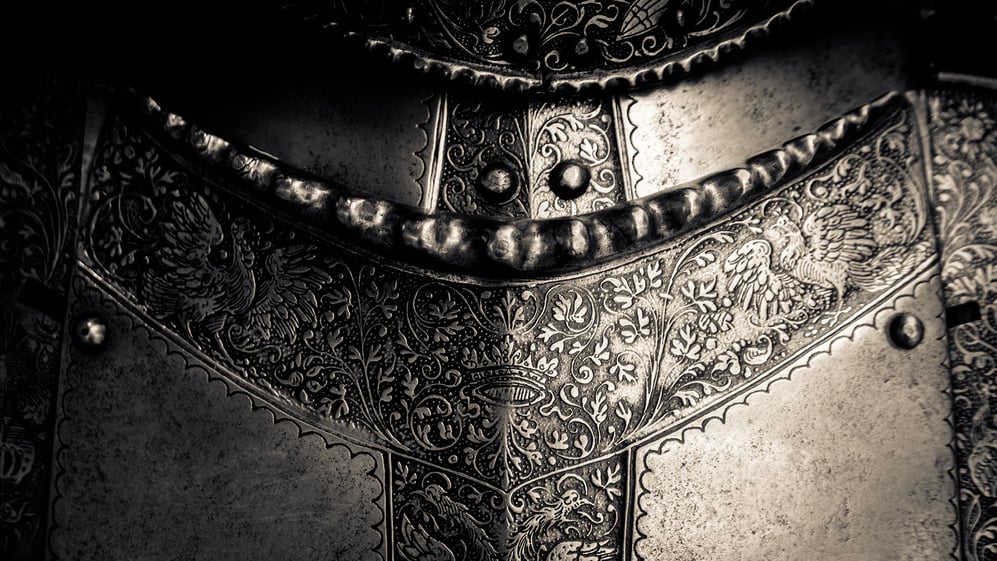This blog post is adapted from Equipped: The Armor of God for Everyday Struggles by Rev. Christopher Kennedy.
Ever pounded on yourself? I hope not physically. But I suspect we all have been hard on ourselves. Luther felt like he could never do enough. He couldn’t do enough good things. He couldn’t express enough remorse for his sinfulness. Perhaps you can relate to feeling guilty over not doing enough. If you have a parent in a nursing home, you might feel guilty that you don’t visit or call enough. If you’re a parent with children at home, you might feel guilty that you missed an event, that you don’t have your child in enough activities, or that you haven’t done enough to help your child get ahead in school. If a project doesn’t turn out well at work, you might blame yourself, saying, “I should have put in more hours,” or, “I should have supervised more closely.” Any of us can be burdened by our conscience, feeling we haven’t done enough.
Similarly, many people feel inadequate in their relationship with God. When tragedy strikes, you may wonder if you suffered because you weren’t devoted enough or sincere enough in your faith. When a loved one falls ill or dies, you may wonder if you could have changed things by praying more. We can worry that personal hardship is a manifestation of God’s displeasure. The bottom-line feeling is “I haven’t done enough.” When feelings of guilt weigh down our hearts—bang bang bang—it’s like we’re pounding on ourselves.
From Guilt to Grace
For Luther, the turning point from guilt to grace came by reading, understanding, and believing God’s Word. The key passage was Romans 1:17: “The righteous shall live by faith.” Through Scripture, Luther discovered that a good relationship with God was a gift received by faith, not by being hard on himself. As Luther read deeper into Romans, he encountered passages like this one: “The righteousness of God has been manifested . . . through faith in Jesus Christ for all who believe. For there is no distinction: for all have sinned and fall short of the glory of God, and are justified by His grace as a gift, through the redemption that is in Christ Jesus” (Romans 3:21–24).
Luther described this righteousness as an alien righteousness, something totally outside of him. Once the Gospel message clicked in his mind and heart, Luther declared, “I felt that I was altogether born again and had entered paradise itself through open gates.” With his mind fixed on Jesus, Luther’s heart was set free from the overwhelming guilt that had oppressed him.
Christ Gives Relief
It is the truth above all truths: salvation is all about Jesus. Our relief from guilt comes from a Savior who suffered in our place, a Savior who felt the pounding of a hammer driving nails through His hands into a wooden cross.
On the cross, He took the punishment we deserved. Bang bang bang.
Our guilt. Bang bang bang.
Our shame. Bang bang bang.
All of it was laid on Jesus: “He is the propitiation [atoning sacrifice] for our sins, and not for ours only but also for the sins of the whole world” (1 John 2:2). Our righteousness is found in Christ alone.
Protecting What is Vital
God invites us to put on the breastplate of righteousness so that we can find comfort in Jesus. In the preceding chapter, we talked about how the belt of truth affects our eternity and our everyday lives. By the truth of the Gospel, we’re saved for eternity, and by God’s truth, we’re also rescued from the daily lies and temptations the devil throws at us. Similarly, God’s gift of righteousness changes our eternity and also affects our everyday experience.
With the connection to a breastplate, Paul shows the centrality of righteousness in the Christian faith. The breastplate was an integral part of a soldier’s armor. It protected the torso, which contains vital organs like the heart and lungs. Soldiers wore a breastplate because anything could happen in the field of battle. While a soldier could raise a shield to ward off enemy blows, an attack could come from any angle. The breastplate provided protection against attacks from unexpected directions.
A story in 1 Kings 22 proves the importance of the breastplate. King Ahab of Israel was wounded in battle because of a gap in his armor, an opening that his breastplate should have covered. The king was mortally injured when a soldier “drew his bow at random and struck the king of Israel between the scale armor and the breastplate” (v. 34). The king lacked the protection he needed in a critical area. As a result, he didn’t survive the enemy’s attack.
What is Righteousness?
In spiritual warfare, we don’t want any gaps in our armor. Therefore, it’s wise to have a comprehensive understanding of what righteousness is all about. The more deeply we grasp God’s truth, the more firmly we can cling to it in time of need.
Theologians make a distinction between imputed and imparted righteousness. Impute isn’t a word we use a lot in common conversation. It means “to assign or ascribe a quality of one person to another.” The only person ever to be perfectly righteous is Jesus. God’s Word teaches us that Jesus was “without sin” (Hebrews 4:15). When Jesus died on the cross, He paid the price for our sins. He took on our sinful status and gave us His perfect record. His righteousness is imputed to us as a gift received by faith. Imputed righteousness, then, refers to our eternal salvation. In that respect, righteousness in Christ is the greatest comfort of all.
The other kind of righteousness is imparted righteousness. This refers to how Christ daily works in us to live for Him. Those who believe in Jesus have the Holy Spirit within them, enabling them to do good things: “For it is God who works in you, both to will and to work for His good pleasure” (Philippians 2:13). Imparted righteousness, too, is a great comfort! It means that God arms us with the breastplate of righteousness, helping us in our daily decisions and actions.
Blog post adapted from Equipped: The Armor of God for Everyday Struggles copyright © 2021 Christopher M. Kennedy. Published by Concordia Publishing House. All rights reserved.
To continue reading about the armor of God that He gives you, as seen in Ephesians 6, order Equipped: The Armor of God for Everyday Struggles below.















